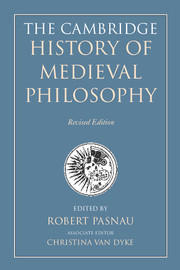Book contents
- Frontmatter
- Contents of Volume 1
- Preface
- List of contributors
- Frontmatter
- Contents of Volume 2
- Introduction
- I Fundamentals
- II Logic and language
- III Natural philosophy
- IV Soul and knowledge
- V Will and desire
- VI Ethics
- VII Political philosophy
- VIII Metaphysics
- 44 The subject of the aristotelian science of metaphysics
- 45 Essence and existence
- 46 Form and matter
- 47 Realism
- 48 Nominalism in the later middle ages∗
- 49 Accidents and modes
- IX Theology
- Appendices
- Bibliography of primary sources
- Bibliography of secondary sources
- Index nominum
- Index rerum
- References
49 - Accidents and modes
from VIII - Metaphysics
Published online by Cambridge University Press: 05 August 2014
- Frontmatter
- Contents of Volume 1
- Preface
- List of contributors
- Frontmatter
- Contents of Volume 2
- Introduction
- I Fundamentals
- II Logic and language
- III Natural philosophy
- IV Soul and knowledge
- V Will and desire
- VI Ethics
- VII Political philosophy
- VIII Metaphysics
- 44 The subject of the aristotelian science of metaphysics
- 45 Essence and existence
- 46 Form and matter
- 47 Realism
- 48 Nominalism in the later middle ages∗
- 49 Accidents and modes
- IX Theology
- Appendices
- Bibliography of primary sources
- Bibliography of secondary sources
- Index nominum
- Index rerum
- References
Summary
The Middle Ages inherited from antiquity an approach to metaphysics which supposed both that, to provide an account of being, one provides a theory of categories, and that a division into substance and accident is fundamental to such an account. During the thousand years between Boethius and Descartes, this fundamental division was subjected to careful scrutiny and modified dramatically. Eventually even the term ‘accident’ was partially eclipsed by a competing term, ‘mode,’ which bespoke a competing metaphysical picture; by the mid-seventeenth century Descartes was able to contrast his ontology of substances and modes with an ontology of substances and “real” accidents.
The doctrine of real accidents that Descartes rejects has two medieval roots. One lies in the related theological mysteries of the Eucharist and the Incarnation, and the other lies in the perceived need for real accidents to account for at least some physical phenomena. This chapter explores how these roots formed and developed, how accidents came to be “real,” and how real accidents came to be perceived as a philosophical mistake.
THE CATEGORIES FRAMEWORK
In his Categories chapter 4, Aristotle lists ten heads under which nouns and adjectives fall: Substance, Quality, Quantity, Relative, Place, Time, Situation, Habit, Action and Passion. Although there is little reason to think Aristotle was wedded to this list, it had special salience in the early medieval period, both because the Categories was translated and commented on by Boethius and because the list was also found in “On the Ten Categories” (De decem categoriae), a work attributed to Augustine (but likely from a hand influenced by Themistius).
- Type
- Chapter
- Information
- The Cambridge History of Medieval Philosophy , pp. 674 - 686Publisher: Cambridge University PressPrint publication year: 2014

